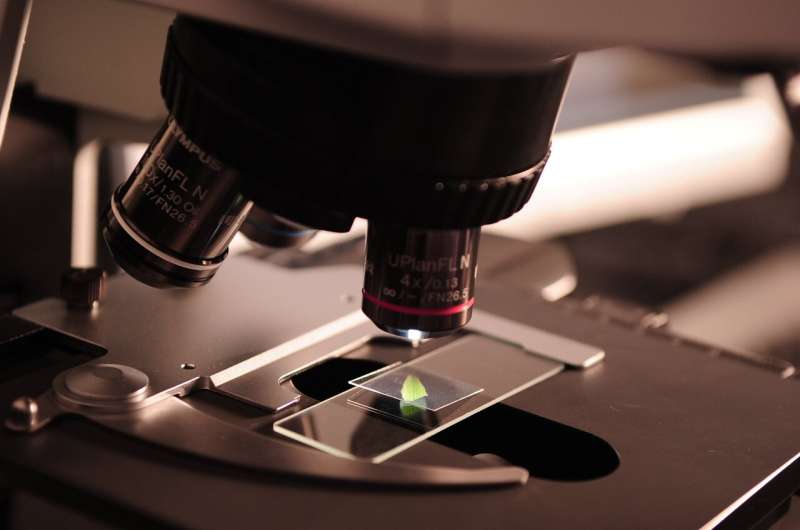This article has been reviewed according to Science X's editorial process and policies. Editors have highlighted the following attributes while ensuring the content's credibility:
fact-checked
peer-reviewed publication
trusted source
proofread
Clinical trial: Some sarcoma patients improve with T cell immunotherapy

A clinical trial led by researchers at Washington University School of Medicine in St. Louis has shown that a T cell immunotherapy—in which the patients' own T cells are genetically modified to attack and kill cancer cells—is effective in treating some patients with rare cancers of the body's soft tissues.
The study, which focused on the rare cancers synovial sarcoma and myxoid round cell liposarcoma (MRCLS), is published in The Lancet.
"When these rare sarcomas have spread, patients have few treatment options, and five-year survival rates are very low," said senior author Brian A. Van Tine, MD, Ph.D., a Washington University professor of medicine who treats patients at Siteman Cancer Center, based at Barnes-Jewish Hospital and Washington University School of Medicine.
"There is a great need for more effective therapies, but standard immunotherapies don't work well for sarcomas. With this T cell immunotherapy, there is a subset of patients who have experienced an excellent long-term response. But for some patients, the treatment works for a little while and the cancer returns; and for others, it doesn't work at all. We are hopeful we can build on the success of this clinical trial and make this type of therapy effective for more patients."
The investigational immunotherapy that was used in the trial, called afamitresgene autoleucel (afami-cel), involves collecting a patient's T cells and engineering them in the lab with a viral vector, a virus designed to deliver genetic material into cells. The viral vector adds a specific protein onto the surface of the T cells.
When the modified T cells are returned to the patient, the new surface protein—a T cell receptor—directs the T cells to home in on the cancer cells for elimination. Most of these types of sarcomas have a protein on their surface called MAGE-A4, which the newly engineered T cells can then seek and destroy.
The immunotherapy was developed by the biopharmaceutical company Adaptimmune, which funded the international clinical trial. Siteman, which is a major referral center for sarcoma patients nationally, was one of the trial's major sites.
The clinical trial involved 52 patients treated at 23 medical centers in North America and Europe. The trial included 44 patients with synovial sarcoma and eight with MRCLS. To participate in the trial, patients' immune systems had to meet certain criteria in how they present antigens to T cells, to teach the T cells to identify the cancer.
About 36% of the patients (19 of 52) responded to the therapy with tumors shrinking or, in some cases, disappearing entirely. The treatment was more effective for patients with synovial sarcoma than with MRCLS. On average, the duration of the tumor response was just over 11 months for patients with synovial sarcoma and just over four months for patients with MRCLS; most patients' cancers returned after a period of remission. To date, a small number of patients whose tumors disappeared following initial therapy remain cancer-free.
Among all of the patients, average survival was just over 15 months. The probability of survival at one year was 60%. Among patients with synovial sarcoma whose tumors showed a complete response to initial therapy—meaning the tumors disappeared entirely following the single treatment—the probability of survival was 90% at one year and 70% at two years.
The most common side effects of the treatment involved low red and white blood cell counts due to the chemotherapy needed to prepare the body to receive the engineered T cells. Many of the patients required treatment to control cytokine release syndrome, a common inflammatory response to T cell therapies. All 28 deaths that occurred during the follow-up period were found to be due to the cancer eventually progressing and not the investigational treatment.
"We have some patients we're still watching who continue to have a deep, durable response to this single treatment," Van Tine said. "In some cases, the engineered T cells can get into the bone marrow and establish a niche, and these patients haven't needed further treatment. As long as the T cells continue to divide and the tumor continues to carry the target protein, it's an effective therapy in these patients. We're trying to understand what is different about the individuals who do so well, so we can extend this type of effect to more patients in the future."
More information: Sandra P D'Angelo et al, Afamitresgene autoleucel for advanced synovial sarcoma and myxoid round cell liposarcoma (SPEARHEAD-1): an international, open-label, phase 2 trial, The Lancet (2024). DOI: 10.1016/S0140-6736(24)00319-2



















